Tech
The Latest Tech News in Crypto and Blockchain

Dec. 13: The layer-1 blockchain COTI unveiled plans to become the “first privacy-preserving Ethereum layer-2,” according to the team: “To better serve the needs of Web3 companies and consumers, COTI will become an Ethereum-compatible layer 2 that solves the challenges of scalability, liquidity and privacy. COTI V2 will use a specialized cryptographic technology known as Garbled Circuits, performing 10 times more efficiently than ZK (Zero-Knowledge) solutions. The devnet release of COTI V2 is scheduled for Q2 2024.”
Protocol Village is a regular feature of The Protocol, our weekly newsletter exploring the tech behind crypto, one block at a time. Sign up here to get it in your inbox every Wednesday. Project teams can submit updates here. For previous versions of Protocol Village, please go here. Also please check out our weekly The Protocol podcast.
Hedera Council Names Former Aptos, Polygon Executive Charles Adkins as President
Dec. 13: The Hedera Council today announced the appointment of Charles Adkins as its new president. “A former leader at Aptos and Polygon, Adkins brings a wealth of experience in Web3 technology, as well as in finance, government, and consumer brands. This diverse experience makes Adkins a valuable addition to the Hedera leadership team, while bringing a new set of relationships to the Hedera ecosystem.” (HBAR)
Liquid Collective Says BitGo to Offer Qualified Custody for LsETH
Dec. 13: Liquid Collective, “an institutional liquid staking protocol that achieved 900% TVL growth in Q3 alone, announced that BitGo has joined as a custodian to offer Qualified Custody for LsETH, Liquid Collective’s receipt token,” according to the team. “This move represents BitGo’s entrance into the institutional liquid staking space, as Liquid Collective’s LsETH is the first and only Liquid Staking Token (LST) that BitGo offers custody support for. BitGo’s support of LsETH will allow all BitGo users and LsETH holders to participate securely in the largest DeFi sector.”
Interchain Foundation, Supporting Cosmos, Plans $26.4M of 2024 Funding
Dec. 13: The Interchain Foundation, which supports the Cosmos blockchain ecosystem, detailed $26.4 million of planned funding in 2024. That compares with a $40 million budget estimate for 2023, released in February 2023, though final spending numbers are not in yet.
-
$3,000,000 will be allocated to ensure the continued modularity, efficiency, and stability of CometBFT, the Byzantine fault-tolerant engine for state machine replication.
-
$4,500,000 will be allocated to expand composability of the Cosmos SDK, the world’s most popular framework for building secure and highly performant application-specific blockchains.
-
$7,500,000 will be allocated to the Inter-Blockchain Communication Protocol, the leading blockchain interoperability protocol, enabling secure and permissionless transfer of arbitrary data for dedicated expansion across blockchain ecosystems.
-
$2,500,000 will be allocated to CosmWasm, the smart contract framework focusing on security, performance, and interoperability to enhance dApp functionality and IBC connectivity.
-
$155,000 will be allocated to CosmJS, a library that helps developers integrate their JavaScript-based clients – frontend user interfaces or server-side clients – with Cosmos SDK blockchain to bridge gaps in Cosmos SDK compatibility.
-
$1,500,000 will be allocated towards security audits for the Interchain Stack.
Fetch.ai, SingularityNET to Tackle AI ‘Hallucination,’ Non-Determinism
Dec. 13: Fetch.ai and SingularityNET, two organizations in AI and Web3, said they will “join forces to solve critical issues in the AI space, according to the team. “These include ‘hallucination,’ when LLMs give nonsensical/irrelevant outputs, and non-determinism. Harnessing the core technologies of both, the pair will introduce AI models that are more reliable and have enhanced reasoning so developers can access the tools needed to create their own, more reasoning-capable LLMs via simple APIs and traditional programming languages. Available in 2024, the interface will merge LLMs and AI agents for an open, dynamic marketplace that connects users to services.”
Hyperion Decimus, CoinDesk Indices Announce ‘HD CoinDesk TrendMax Strategy’
Dec. 13: Hyperion Decimus (HD), a digital asset management firm and a sponsor of a multi-strategy crypto hedge fund, and CoinDesk Indices (CDI), a subsidiary of CoinDesk and the leading provider of digital asset indices by AUM since 2014, announced the launch of the HD CoinDesk TrendMax Strategy. According to the team: “This quantitative trading strategy is built on weighted signals from CoinDesk Indices’ proprietary Bitcoin Trend Indicator (BTI) and Ether Trend Indicator (ETI), which each convey the presence, direction and strength of the trend in the price of bitcoin and ether respectively by using purpose-built, non-discretionary algorithms.”
Dec. 12: Celestia, a so-called data availability (DA) solution designed to provide a cheaper alternative for verifying data generated from blockchain transactions, announced Tuesday that it will become an option for blockchain builders using Polygon’s software tools to spin up new layer-2 networks atop Ethereum.
Matter Labs, Chainlink Labs Announce Price Feeds Now on zkSync Era
Dec. 12: Matter Labs and Chainlink Labs announced that Chainlink Price Feeds are live on zkSync Era, the zkEVM Ethereum layer-2 scaling solution. According to the team: “This collaboration, part of the Chainlink SCALE program, aims to enhance DeFi protocols on zkSync, reducing gas costs and providing reliable oracle services.”
Vertex Protocol Partners With Axelar on Cross-Chain Collateral Deposits
Dec. 12: Decentralized exchange Vertex Protocol has partnered with Axelar to enable cross-chain collateral deposits through an integration of the Squid Router, according to the team: “Traders can now bridge and deposit from eight different chains (Ethereum, Binance Smart Chain, Optimism, Polygon, Avalanche, Base Chain, Mantle and Fantom) directly into their trading accounts, through seamless deposits within an average processing time of only two minutes.
Pi Network Debuts ‘Decentralized Moderation’ on Fireside Forum App
Dec. 12: Pi Network debuted “Decentralized Moderation” on its Web3 app Fireside Forum, according to the team: “This cultivates a self-sustaining environment where users are active contributors in shaping the content narrative. Key aspects: Unique Tiered Moderation: a system where each tier has its own responsibilities with token-based incentives and disincentives; Tokenomics and Stakes: every decision and action in the system is backed by real stakes – if an action is challenged and overridden, it translates into a cost; Structured Fairness: curated token rewards and penalties are devised with fairness and accountability in mind.”
Nil Foundation Releases Features of New zkEVM
Dec. 12: Nil Foundation announced the features of its new Type-1 zkEVM powered by zkLLVM, “making it the first zkEVM with core components built automatically, preventing insecurities that result from manual circuit definition,” according to the team: “Nil’s zkEVM is designed to have security as a fundamental feature enabled by its proprietary zkLLVM compiler. The zkLLVM quickly and automatically compiles high-level code (C++ or Rust) into efficient zk-SNARK circuits. Starkly contrasting the current industry standard of manually defining circuits, which is time-intensive, creates overly complex circuits, and can introduce human error.”
Nym, Protocol Labs, Oasis, Aztec Create Universal Privacy Alliance
Dec. 12: A group of Web3 companies including Nym, Protocol Labs, Filecoin Foundation, Oasis and Aztec have founded the Universal Privacy Alliance (UPA), according to a message from the team, led by Nym: “This is the first alliance of its kind which aims to advocate for global digital privacy rights, represent privacy-focused tech firms and engage with policymakers on critical issues like eIDAS and the Digital Services Act. The founders have collectively contributed funds to support immediate advocacy efforts + mission includes policy education.”
Verida, inDAO Collaborate on Uzbekistan Web3 Focus
Dec. 12: Verida, a self-sovereign digital identity provider, and inDAO have collaborated for “36M Uzbekistan citizens to enter Web3 economy,” according to the team: “Leveraging inDAO’s blockchain and Verida’s Web3 wallet, the initiative includes projects such as zero-knowledge credentials for students as proof of their completed studies, safe healthcare data access and real estate digitization. The customized Verida wallet, integrated with the inDAO blockchain, showcase how self-sovereign digital technology can drive economic growth and transform Uzbekistan into a digital-first and efficient economy.”
Oasys Enables Single-Click ‘Verse’ Building
Dec. 12: Oasys, the blockchain gaming hub, has been “working to enable Verse building on their platform with a single click while simplifying blockchain gaming and metaverse launches on the Oasys ecosystem,” according to the team: “Through a new partnership with AltLayer, the decentralized interlayer for rollups, Oasys is enabling one-click deployment through AltLayer’s no-code rollup launcher. Users can now create and launch their Verse on the Oasys platform with all of AltLayer’s user-friendly dashboards, and with just one click, can build blockchain games on Layer 2.”
SSV, for Ethereum Distributed Validator Technology, Goes Permissionless
Dec. 12: SSV.Network, an Ethereum distributed validator technology (DVT) staking infrastructure, announces its permissionless launch, marking a significant advancement in ETH staking, according to the team: “Following three years of development, it democratizes Ethereum staking, breaking entry barriers and inviting public validators and node operators into the network. The launch, promoting decentralization and offering robust infrastructure, is accompanied by a year-long incentivization program, earmarking 1 million $SSV tokens to reward validator registrations.”
Bitget Invests in Layer 2 Consumer-Centric Blockchain Morph
Dec. 11: Bitget, a crypto derivatives exchange, is making a multimillion-dollar Investment in the Ethereum layer-2 consumer-centric blockchain Morph (whose name recently changed from Morphism), according to the Morph team: “Morph’s innovative roll-up technology combines optimistic and ZK rollups to offer cost-effective, secure, and scalable transactions. The company is dedicated to bridging the divide between the present state of blockchain technology and everyday practical dApps that extend beyond traditional cryptocurrency transactions.” Exact terms weren’t disclosed.
Seamless Protocol Issues SEAM, Bags First Base-Blockchain Token Listing on Coinbase
Dec. 11: Seamless Protocol, a project on Coinbase’s Base ecosystem, issued governance tokens that will trade on the crypto exchange with the ticker SEAM starting at 18:00 UTC Monday. Seamless is a lending and borrowing protocol. It is among the top platforms on the layer-2 blockchain, with a total value locked (TVL) of over $10 million. SEAM will be the first Base token listed on Coinbase. It was airdropped to users based on their involvement on the Seamless platform, such as funds supplied to and borrowed from the various trading pools. There was no public or private sale of SEAM tokens.
Decentralized Exchange Uniswap Expands to Bitcoin Sidechain Rootstock
Taiwan Completes Wholesale CBDC Technical Study, Central Bank Official Says
Dec. 11: Taiwan’s central bank has finished a technical study of a wholesale central bank digital currency (CBDC), according to Deputy Governor Chu Mei-lie.
Connext, Protocol for Cross-Chain Apps, Plans Bacco Upgrade Next Week
Dec. 8: Connext, a modular protocol for securely passing funds and data between chains and building cross-chain apps, announced that their latest network upgrade, Bacco, is coming Dec. 14. This follows several months of development with core development teams Proxima Labs and Wonderland, according to the team: “Bacco will upgrade the existing ‘slow path’ of Connext to operate optimistically, reducing the operational costs of supporting new chains by 90%. Additionally, the upgrade paves the way for many new chains and L2s to operate on Connext, with approval for support of 20 new chains and L2s already on the way.”
Diva Staking, Octant in Partnership for 100K ETH ($220M Allocation)
Dec. 8: Diva Staking, an Ethereum liquid staking protocol powered by distributed validator technology, said in a press release that it has “joined forces” with Octant, a platform for experiments in participatory public goods funding, to “decentralize Ethereum’s staking landscape,” according to the team. “The Golem Foundation is planning a phased transition of its validators to Diva’s DVT, contingent on the maturity and extensive testing of their technology. This includes allocating up to 100,000 ETH to Diva Staking, worth approximately $220M at the time of writing. The news follows Diva Staking’s ‘Early Stakers Initiative,’ powered by Enzyme Finance, with over 18,000 stETH (approximately $40M) secured in Diva’s vault as of Dec. 5.” (ETH)
Diagram of Diva Staking’s distributed validator technology setup. (Diva Staking)
Brahma Raises $2.5M After Launching ‘On-Chain Execution’ Platform Console
Dec. 8: Brahma, developer of Console, an institutional on-chain execution and automation platform using Safe smart accounts for custody, raised a $2.5M seed extension, according to the team. Investors included Greenfield, joined by Framework, Safe Foundation, Maven11 and Bitscale. The product launch was announced earlier in the week. “Brahma Console enables asset managers, DAOs and power users to delegate and automate their on-chain execution collaboratively. Console sports Access Control and delegation capabilities with Sub-Accounts and granular transaction policies, an automation module with on/off-chain trigger support, as well as an Execution toolkit which fully manages gas, RPC routing and transaction lifecycle. Console users maintain ownership and independent access to their Safes.”
Chainlink Staking Program Quickly Pulls in $600M, Hitting Limit
Dec. 8: Chainlink, the biggest blockchain data-oracle project, saw a powerful uptake for its expanded crypto-staking program, pulling in over $632 million worth of its LINK tokens and filling up to the limit just six hours after the start of an early-access period, the company said in a press release. (LINK)
Avail, for Data Availability, Sees ‘Solid Foundation’ for Q1 Mainnet Launch
Dec. 8: Avail, a modular blockchain data availability solution, said its testnet, launched Oct. 31, is seeing engagement levels “suggesting a solid foundation” for network security ahead of a planned mainnet launch in the first quarter of 2024, according to a message from the team. A little over a month in, the testnet boasts 220 validators. For comparison, the rival data availability network Celestia, which launched its mainnet on in late October, has 170 total validators, according to data on Mintscan.
Flare Onboards Ankr, Figment as Both Validators, Data Providers
Dec. 8: Flare, a layer-1 blockchain compatible with Ethereum’s EVM standard, has onboarded Ankr, Figment, Restake, Luganodes and NorthStake as both validators and data providers for the network’s native oracles and for the first time in crypto, according to a web post. “With this move, Flare becomes the first smart-contract platform for whom these institutional validators also provide decentralized data feeds for builders on the network and provide a far wider variety of decentralized data,” based on a message from the team. The press release added: “Flare currently has a total of 91 network validators across the globe, all of whom also act as data providers for the Flare Time Series Oracle (FTSO).”
Tether Provides Tech Support to El Salvador’s ‘Freedom Visa’ Program
Dec. 8: Tether, issuer of USDT, the world’s biggest stablecoin at $90 billion, is participating in El Salvador’s new “Freedom Visa” program as a tech provider. CEO Paolo Ardoino said in a press release: “It represents a unique opportunity for us to utilize our technological capabilities to foster growth and innovation in the region. Being chosen as the tech provider underscores the importance of robust infrastructure in driving meaningful change. This partnership reinforces our dedication to advancing technology, empowering nations, and enabling individuals to invest in a future where innovation and progress go hand in hand.”
 El Salvadoran President Nayib Bukele. (Government of El Salvador, modified by CoinDesk)
El Salvadoran President Nayib Bukele. (Government of El Salvador, modified by CoinDesk)
Animoca Raises Additional $11.9M for Mocaverse
Dec. 8: Animoca Brands disclosed raising $11.9 million in a second tranche of funding for Mocaverse, following a previous $20 million raise announced in September. “Participants in this second tranche of funding for Mocaverse included Block1, OKX Ventures, Foresight Ventures, Polygon Ventures, Dapper Labs, and others. In both tranches Animoca Brands raised the funds via the issue of new ordinary shares at a price per share of A$4.50; as part of each raise, the Company granted to the investors in each round a free-attaching utility token warrant on a 1:1 dollar basis,” according to a press release.
SKALE Wins Vote to Approve Chain Pricing
Dec. 8: SKALE is the first blockchain to embrace an appchain infrastructure with zero gas fees for the end user, based on a vote by the community. According to the team: “The SKALE Chain Pricing proposal brings sustainability to the blockchain, where chain owners’ subscription payments offer validators an additional revenue stream and eliminate user gas fees. This vote will propel the network into the next phase, making it one of the only blockchains to run in an economically viable manner where without inflation. The network runs at a profit for decentralized workers and stakers.”
Engineering Association IEEE to Issue Credentials on Avalanche C-Chain
Dec. 8: The Institute of Electrical and Electronics Engineers, with over 426,000 members in more than 160 countries, plans to issue credentials and certificates on the Avalanche C-Chain, according to a tweet. The effort will “make the verification process tamper-proof, instant and secure,” the post read. The team wrote in a message: “As a leader in setting technical standards, IEEE’s embrace of the blockchain for credentialing marks a significant milestone in the adoption of Web3.” (AVAX)
Blockaid Releases ‘Transaction Safety’ Feature for Rainbow Wallet
Dec. 8: Blockaid, a provider of Web3 security tools, announced a new “Transaction Safety” feature on Rainbow wallet, according to the team: “This security upgrade will provide millions of Rainbow wallet users with real-time protection against malicious sites and apps, and full transparency into the path of each Web3 transaction before signing any confirmations.”
Lantern Launches Staking Platform in 15 U.S. states
Dec. 7: Lantern Finance, a Web3 startup, has launched its user-friendly staking platform in 15 U.S. states, including major markets like California, Pennsylvania, Illinois, Virginia, and Massachusetts, according to the team: “Inspired by the cofounders’ experiences with the 2022 crypto bankruptcies, Lantern aims to redefine the crypto landscape with an emphasis on clarity, security, and regulatory adherence. The platform’s goal is to democratize access to crypto banking services, making complex tasks like staking and taking on loans accessible and intuitive for everyday users, while upholding the highest standards of safety and compliance.”
Blocknative Releases New Ethereum Mempool Explorer, to Help With MEV Protection
Dec. 7: Blocknative, a blockchain infrastructure company that cut staff in October after suspending work on a major business project, is releasing a new tool to examine the “mempool” of pending transactions awaiting processing on Ethereum, an effort that could ultimately help to reduce instances of block-level manipulation and protect users from front-running bots. The real-time explorer tool is called ethernow.xyz, which gives insights into Ethereum mempool data and the block building process, and Blocknative CEO Matt Cutler described it as the Etherscan for pre-chain data.
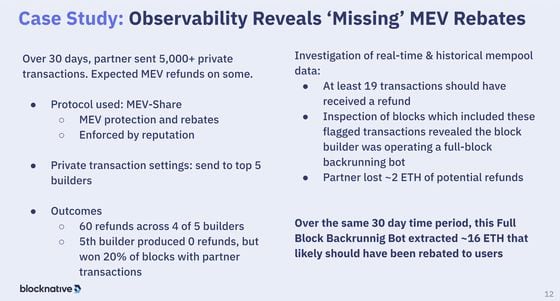 Slide from a Dec. 6 presentation by Blocknative CEO Matt Cutler at a Columbia University blockchain conference in New York. (Blocknative)
Slide from a Dec. 6 presentation by Blocknative CEO Matt Cutler at a Columbia University blockchain conference in New York. (Blocknative)
Orchid, Decentralized Bandwidth Marketplace, Could Expand to Data Storage With ‘Storchid’
Dec. 7: The community supporting Orchid, the decentralized bandwidth marketplace and VPN app, has a new open-source initiative, “Storchid,” which expands the Orchid to include data storage and address the trust and security holes in the current centralized data storage standards, according to the team: “The initiative builds on existing core technologies such as erasure coding, bonded commitments and stake-weighted random selection for incentive alignment. A core component is the Orchid Directory Mechanism where clients and providers alike are incentivized to maintain marketplace security.”
Jack Dorsey’s Block Bitkey Bitcoin Wallet Comes to Market in More Than 95 Countries
Dec. 7: Jack Dorsey’s fintech company Block (SQ) has unveiled its self-custody bitcoin wallet Bitkey for pre-order in more than 95 countries. Bitkey consists of a mobile app, hardware device and a set of recovery tools, Block announced on Thursday.
 Bitkey includes a mobile app, hardware device, and a set of recovery tools, according to the company. (Block/Business Wire)
Bitkey includes a mobile app, hardware device, and a set of recovery tools, according to the company. (Block/Business Wire)
Uphold Launches Vault for ‘Assisted Self-Custody,’ Starting With XRP
Dec. 7: Uphold, a Web3 financial platform, on Thursday launched the beta version of its new assisted self-custody wallet, Vault, which uniquely addresses the UX issues that plague users of typical crypto wallets and self-custody solutions, according to a press release. “The first digital asset that will be supported on Vault is the XRP token, the native token of the XRP Ledger, a decentralized layer 1 blockchain. Vault will expand to offer additional chains starting with BTC in Q1,” according to the release.
Neon EVM Integrates With Web3 Marketing Protocol Tide
Dec. 7: Neon EVM, a smart-contract program on the Solana blockchain that accepts Ethereum-like transactions, integrates with Tide, a Web3 marketing and data analytics protocol, according to the team: “Tide’s approach incentivizes repeated community and product engagement, tracking on-chain transactions and fostering vibrant decentralized communities. With Neon’s cutting-edge dApp ecosystem and Tide’s features like building brand awareness, learn-to-earn incentives, Web3 quests and referral programs, users can participate in the first Neon EVM campaigns on Tide to earn badges and tokens on the newly launched chain.”
Aori Launches, Aims to Bridge ‘CEX/DEX Gap’
Dec. 7: Aori, an off-chain orderbook protocol with permissionless settlement, launches today to create more capital efficient peer-to-peer markets on Ethereum, according to the team: “Aori uses MEV ‘searchers’ as market makers for quicker settlements, bridging the CEX/DEX gap. It focuses on gasless order creation, fair pricing and speedy settlements. Aori is intended to feel like a CEX experience but is entirely self-custodied. All transactions clear through Seaport, also utilized by OpenSea. Aori seeks to move existing on-chain infrastructure off-chain, to minimize smart contract risk wherever possible.”
Safe, Sygnum Bank, CoinCover Launch ‘RecoveryHub’
Dec. 7: Safe is joining forces with Sygnum Bank and CoinCover to launch Safe{RecoveryHub}, offering a suite of crypto recovery options ranging from fully self-custodial to fully custodial, catering to individual and institutional needs, according to the team: “With Safe{RecoveryHub}, users can recover access to their accounts through designated recoverers, which can be personal backup devices, family members and collaborators, also known as social recovery. In addition, trusted third-party services like Sygnum and CoinCover can be designated as recoverers to facilitate the recovery of assets in the case of lost keys.”
Namada Makes Initial NAM Token Allocations Under Retroactive Public Goods Funding
Dec. 7: Namada, a protocol that introduced to the world the concept of privacy as a public good, and scheduled to launch early next year, has initiated the Retroactive Public Goods Funding (RPGF) program, allocating 6.5% of its total NAM token supply to acknowledge and reward the invaluable contributions of individuals in the privacy, zero-knowledge (ZK) technology, and related ecosystems, according to the team. This distribution extends to:
– Developers of Zcash infrastructure.
– Rust dependencies vital for Namada.
-Contributors to various cryptographic protocols.
– Decentralized privacy solutions.
HyperOracle Integtes zkOracle Protocol With Polygon CDK
Dec. 7: HyperOracle integrates its zkOracle protocol with Polygon CDK, enhancing DeFi and on-chain AI capabilities, according to the team: “This collaboration enables the creation of advanced dApps, including decentralized stablecoins and AI-powered applications. Polygon CDK’s launch of ZK-powered layer-2 chains on Ethereum is augmented by HyperOracle’s zkOracle, offering verifiable compute and historical on-chain data access. The collaboration aims to drive innovation in DeFi, with HyperOracle co-developing a new zk-WASM based proving backend for Polygon CDK.”
Bitcoin Project Babylon Raises $18M to Bolster Development of Staking Protocol
Dec. 7: Bitcoin-focused project Babylon raised $18 million in an investment round led by Polychain Capital and Hack VC. Babylon is a marketplace offering bitcoin (BTC) as a staking asset, allowing proof-of-stake chains to acquire funding from the swells of capital stored in the largest cryptocurrency. Babylon will use the funds to advance the development of the staking protocol, according to an emailed statement shared with CoinDesk on Thursday. Framework Ventures, Polygon Ventures, Castle Island Ventures, OKX Ventures, Finality Capital, Breyer Capital and Symbolic Capital also participated in the fundraise.
Beam to Launch on Immutable zkEVM, Gaming-Focused L2 With Polygon Tech
Dec. 6: Beam, an open-source blockchain specialized for gaming and run by Merit Circle DAO, will now launch on Immutable zkEVM, a groundbreaking scaling solution powered by Polygon, according to the team: “Beam is an ecosystem and a blockchain. We want to remain chain-agnostic. Where we started as a subnet on Avalanche, we don’t want to limit ourselves to the Avalanche ecosystem. Right now, we’re working with Immutable to launch some of our products on the zkEVM, and integrate that network into our products as well.”
Tech
Harvard Alumni, Tech Moguls, and Best-Selling Authors Drive Nearly $600 Million in Pre-Order Sales
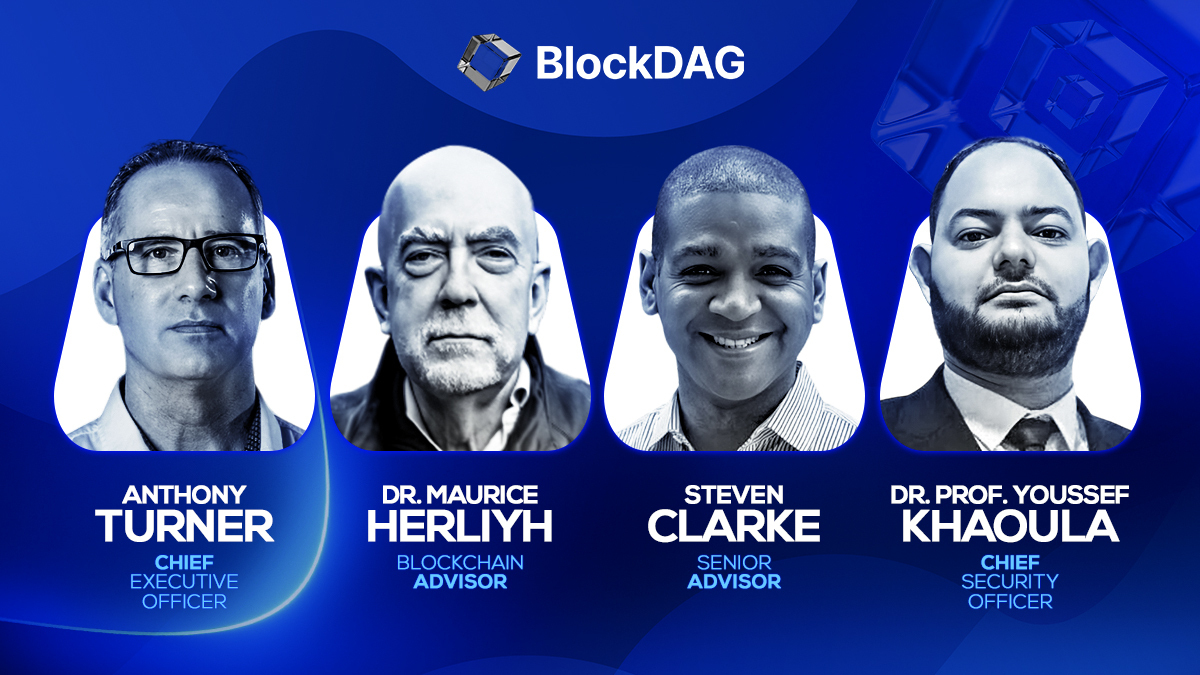
BlockDAG Network’s history is one of innovation, perseverance, and a vision to push the boundaries of blockchain technology. With Harvard alumni, tech moguls, and best-selling authors at the helm, BlockDAG is rewriting the rules of the cryptocurrency game.
CEO Antony Turner, inspired by the successes and shortcomings of Bitcoin and Ethereum, says, “BlockDAG leverages existing technology to push the boundaries of speed, security, and decentralization.” This powerhouse team has led a staggering 1,600% price increase in 20 pre-sale rounds, raising over $63.9 million. The secret? Unparalleled expertise and a bold vision for the future of blockchain.
Let’s dive into BlockDAG’s success story and find out what the future holds for this cryptocurrency.
The Origin: Why BlockDAG Was Created
In a recent interview, BlockDAG CEO Antony Turner perfectly summed up why the market needs BlockDAG’s ongoing revolution. He said:
“The creation of BlockDAG was inspired by Bitcoin and Ethereum, their successes and their shortcomings.
If you look at almost any new technology, it is very rare that the first movers remain at the forefront forever. Later incumbents have a huge advantage in entering a market where the need has been established and the technology is no longer cutting edge.
BlockDAG has done just that: our innovation is incorporating existing technology to provide a better solution, allowing us to push the boundaries of speed, security, and decentralization.”
The Present: How Far Has BlockDAG Come?
BlockDAG’s presale is setting new benchmarks in the cryptocurrency investment landscape. With a stunning 1600% price increase over 20 presale lots, it has already raised over $63.9 million in capital, having sold over 12.43 billion BDAG coins.
This impressive performance underscores the overwhelming confidence of investors in BlockDAG’s vision and leadership. The presale attracted over 20,000 individual investors, with the BlockDAG community growing exponentially by the hour.

These monumental milestones have been achieved thanks to the unparalleled skills, experience and expertise of BlockDAG’s management team:
Antony Turner – Chief Executive Officer
Antony Turner, CEO of BlockDAG, has over 20 years of experience in the Fintech, EdTech, Travel and Crypto industries. He has held senior roles at SPIRIT Blockchain Capital and co-founded Axona-Analytics and SwissOne. Antony excels in financial modeling, business management and scaling growth companies, with expertise in trading, software, IoT, blockchain and cryptocurrency.
Director of Communications
Youssef Khaoulaj, CSO of BlockDAG, is a Smart Contract Auditor, Metaverse Expert, and Red Team Hacker. He ensures system security and disaster preparedness, and advises senior management on security issues.
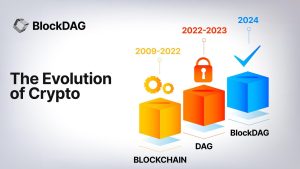
advisory Committee
Steven Clarke-Martin, a technologist and consultant, excels in enterprise technology, startups, and blockchain, with a focus on DAOs and smart contracts. Maurice Herlihy, a Harvard and MIT graduate, is an award-winning computer scientist at Brown University, with experience in distributed computing and consulting roles, most notably at Algorand.
The Future: Becoming the Cryptocurrency with the Highest Market Cap in the World
Given its impressive track record and a team of geniuses working tirelessly behind the scenes, BlockDAG is quickly approaching the $600 million pre-sale milestone. This crypto powerhouse will soon enter the top 30 cryptocurrencies by market cap.
Currently trading at $0.017 per coin, BlockDAG is expected to hit $1 million in the coming months, with the potential to hit $30 per coin by 2030. Early investors have already enjoyed a 1600% ROI by batch 21, fueling a huge amount of excitement around BlockDAG’s presale. The platform is seeing significant whale buying, and demand is so high that batch 21 is almost sold out. The upcoming batch is expected to drive prices even higher.

Invest in BlockDAG Pre-Sale Now:
Pre-sale: https://purchase.blockdag.network
Website: https://blockdag.network
Telegram: https://t.me/blockDAGnetwork
Discord: Italian: https://discord.gg/Q7BxghMVyu
No spam, no lies, just insights. You can unsubscribe at any time.
Tech
How Karak’s Latest Tech Integration Could Make Data Breaches Obsolete
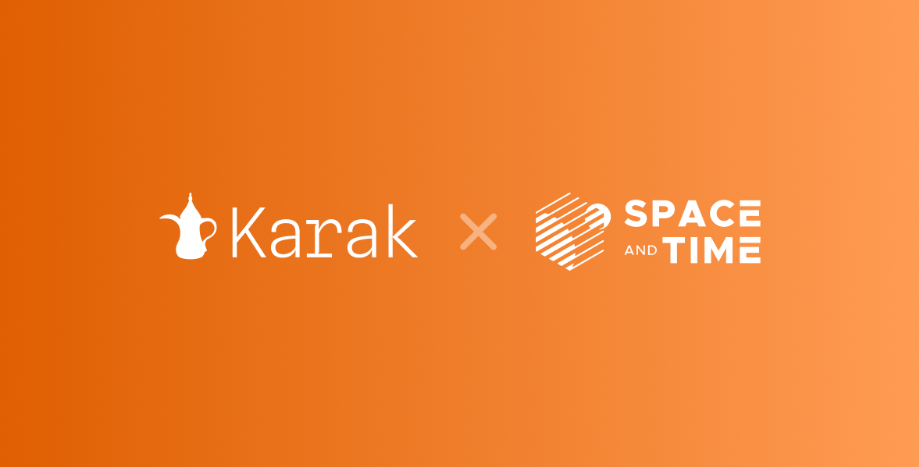
- Space and Time uses zero-knowledge proofs to ensure secure and tamper-proof data processing for smart contracts and enterprises.
- The integration facilitates faster development and deployment of Distributed Secure Services (DSS) on the Karak platform.
Karak, a platform known for its strong security capabilities, is enhancing its Distributed Secure Services (DSS) by integrating Space and Time as a zero-knowledge (ZK) coprocessor. This move is intended to strengthen trustless operations across its network, especially in slashing and rewards mechanisms.
Space and Time is a verifiable processing layer that uses zero-knowledge proofs to ensure that computations on decentralized data warehouses are secure and untampered with. This system enables smart contracts, large language models (LLMs), and enterprises to process data without integrity concerns.
The integration with Karak will enable the platform to use Proof of SQL, a new ZK-proof approach developed by Space and Time, to confirm that SQL query results are accurate and have not been tampered with.
One of the key features of this integration is the enhancement of DSS on Karak. DSS are decentralized services that use re-staked assets to secure the various operations they provide, from simple utilities to complex marketplaces. The addition of Space and Time technology enables faster development and deployment of these services, especially by simplifying slashing logic, which is critical to maintaining security and trust in decentralized networks.
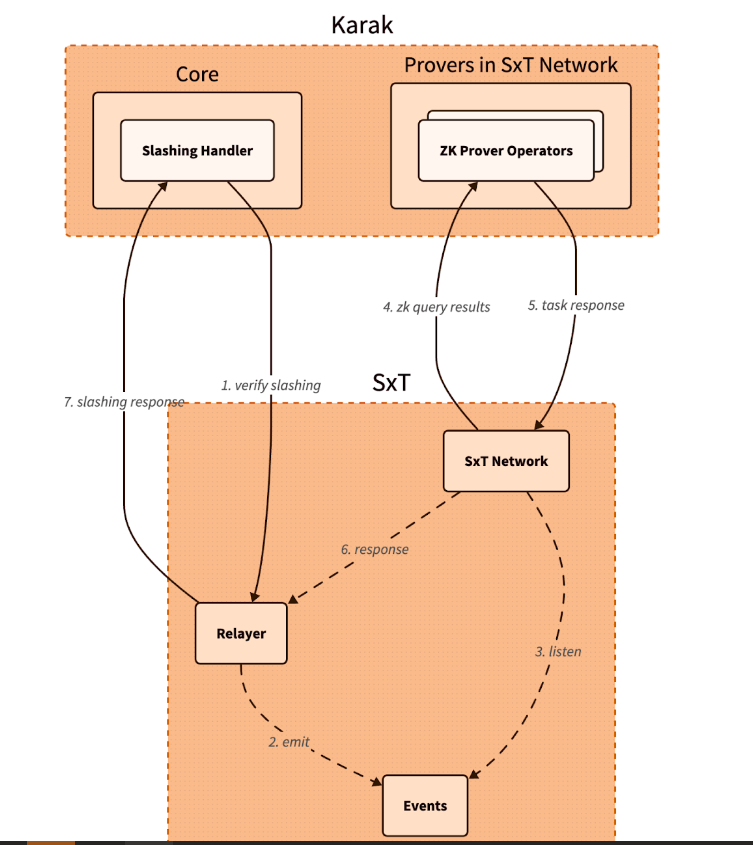
Additionally, Space and Time is developing its own DSS for blockchain data indexing. This service will allow community members to easily participate in the network by running indexing nodes. This is especially beneficial for applications that require high security and decentralization, such as decentralized data indexing.
The integration architecture follows a detailed and secure flow. When a Karak slashing contract needs to verify a SQL query, it calls the Space and Time relayer contract with the required SQL statement. This contract then emits an event with the query details, which is detected by operators in the Space and Time network.
These operators, responsible for indexing and monitoring DSS activities, validate the event and route the work to a verification operator who runs the query and generates the necessary ZK proof.
The result, along with a cryptographic commitment on the queried data, is sent to the relayer contract, which verifies and returns the data to the Karak cutter contract. This end-to-end process ensures that the data used in decision-making, such as determining penalties within the DSS, is accurate and reliable.
Karak’s mission is to provide universal security, but it also extends the capabilities of Space and Time to support multiple DSSs with their data indexing needs. As these technologies evolve, they are set to redefine the secure, decentralized computing landscape, making it more accessible and efficient for developers and enterprises alike. This integration represents a significant step towards a more secure and verifiable digital infrastructure in the blockchain space.
Website | X (Twitter) | Discord | Telegram
No spam, no lies, just insights. You can unsubscribe at any time.
Tech
Cryptocurrency Payments: Should CFOs Consider This Ferrari-Approved Trend?

Iconic Italian luxury carmaker Ferrari has announced the expansion of its cryptocurrency payment system to its European dealer network.
The move, which follows a successful launch in North America less than a year ago, raises a crucial question for CFOs across industries: Is it time to consider accepting cryptocurrency as a form of payment for your business?
Ferrari’s move isn’t an isolated one. It’s part of a broader trend of companies embracing digital assets. As of 2024, we’re seeing a growing number of companies, from tech giants to traditional retailers, accepting cryptocurrencies.
This change is determined by several factors:
- Growing mainstream adoption of cryptocurrencies
- Growing demand from tech-savvy and affluent consumers
- Potential for faster and cheaper international transactions
- Desire to project an innovative brand image
Ferrari’s approach is particularly noteworthy. They have partnered with BitPay, a leading cryptocurrency payment processor, to allow customers to purchase vehicles using Bitcoin, Ethereum, and USDC. This satisfies their tech-savvy and affluent customer base, many of whom have large digital asset holdings.
Navigating Opportunities and Challenges
Ferrari’s adoption of cryptocurrency payments illustrates several key opportunities for companies considering this move. First, it opens the door to new customer segments. By accepting cryptocurrency, Ferrari is targeting a younger, tech-savvy demographic—people who have embraced digital assets and see them as a legitimate form of value exchange. This strategy allows the company to connect with a new generation of affluent customers who may prefer to conduct high-value transactions in cryptocurrency.
Second, cryptocurrency adoption increases global reach. International payments, which can be complex and time-consuming with traditional methods, become significantly easier with cryptocurrency transactions. This can be especially beneficial for businesses that operate in multiple countries or deal with international customers, as it potentially reduces friction in cross-border transactions.
Third, accepting cryptocurrency positions a company as innovative and forward-thinking. In today’s fast-paced business environment, being seen as an early adopter of emerging technologies can significantly boost a brand’s image. Ferrari’s move sends a clear message that they are at the forefront of financial innovation, which can appeal to customers who value cutting-edge approaches.
Finally, there is the potential for cost savings. Traditional payment methods, especially for international transactions, often incur substantial fees. Cryptocurrency transactions, on the other hand, can offer lower transaction costs. For high-value purchases, such as luxury cars, these savings could be significant for both the business and the customer.
While the opportunities are enticing, accepting cryptocurrency payments also presents significant challenges that businesses must address. The most notable of these is volatility. Cryptocurrency values can fluctuate dramatically, sometimes within hours, posing potential risk to businesses that accept them as payment. Ferrari addressed this challenge by implementing a system that instantly converts cryptocurrency received into traditional fiat currencies, effectively mitigating the risk of value fluctuations.
Regulatory uncertainty is another major concern. The legal landscape surrounding cryptocurrencies is still evolving in many jurisdictions around the world. This lack of clear and consistent regulations can create compliance challenges for companies, especially those operating internationally. Companies must remain vigilant and adaptable as new laws and regulations emerge, which can be a resource-intensive process.
Implementation costs are also a significant obstacle. Integrating cryptocurrency payment systems often requires substantial investment in new technology infrastructure and extensive staff training. This can be especially challenging for small businesses or those with limited IT resources. The costs are not just financial; a significant investment of time is also required to ensure smooth implementation and operation.
Finally, security concerns loom large in the world of cryptocurrency transactions. While blockchain technology offers some security benefits, cryptocurrency transactions still require robust cybersecurity measures to protect against fraud, hacks, and other malicious activity. Businesses must invest in robust security protocols and stay up-to-date on the latest threats and protections, adding another layer of complexity and potential costs to accepting cryptocurrency payments.
Strategic Considerations for CFOs
If you’re thinking of following in Ferrari’s footsteps, here are the key factors to consider:
- Risk Assessment: Carefully evaluate potential risks to your business, including financial, regulatory, and reputational risks.
- Market Analysis: Evaluate whether your customer base is significantly interested in using cryptocurrencies for payments.
- Technology Infrastructure: Determine the costs and complexities of implementing a cryptographic payment system that integrates with existing financial processes.
- Regulatory Compliance: Ensure that cryptocurrency acceptance is in line with local regulations in all markets you operate in. Ferrari’s gradual rollout demonstrates the importance of this consideration.
- Financial Impact: Analyze how accepting cryptocurrency could impact your cash flow, accounting practices, and financial reporting.
- Partnership Evaluation: Consider partnering with established crypto payment processors to reduce risk and simplify implementation.
- Employee Training: Plan comprehensive training to ensure your team is equipped to handle cryptocurrency transactions and answer customer questions.
While Ferrari’s adoption of cryptocurrency payments is exciting, it’s important to consider this trend carefully.
A CFO’s decision to adopt cryptocurrency as a means of payment should be based on a thorough analysis of your company’s specific needs, risk tolerance, and strategic goals. Cryptocurrency payments may not be right for every business, but for some, they could provide a competitive advantage in an increasingly digital marketplace.
Remember that the landscape is rapidly evolving. Stay informed about regulatory changes, technological advancements, and changing consumer preferences. Whether you decide to accelerate your crypto engines now or wait in the pit, keeping this payment option on your radar is critical to navigating the future of business transactions.
Was this article helpful?
Yes No
Sign up to receive your daily business insights
Tech
Bitcoin Tumbles as Crypto Market Selloff Mirrors Tech Stocks’ Plunge
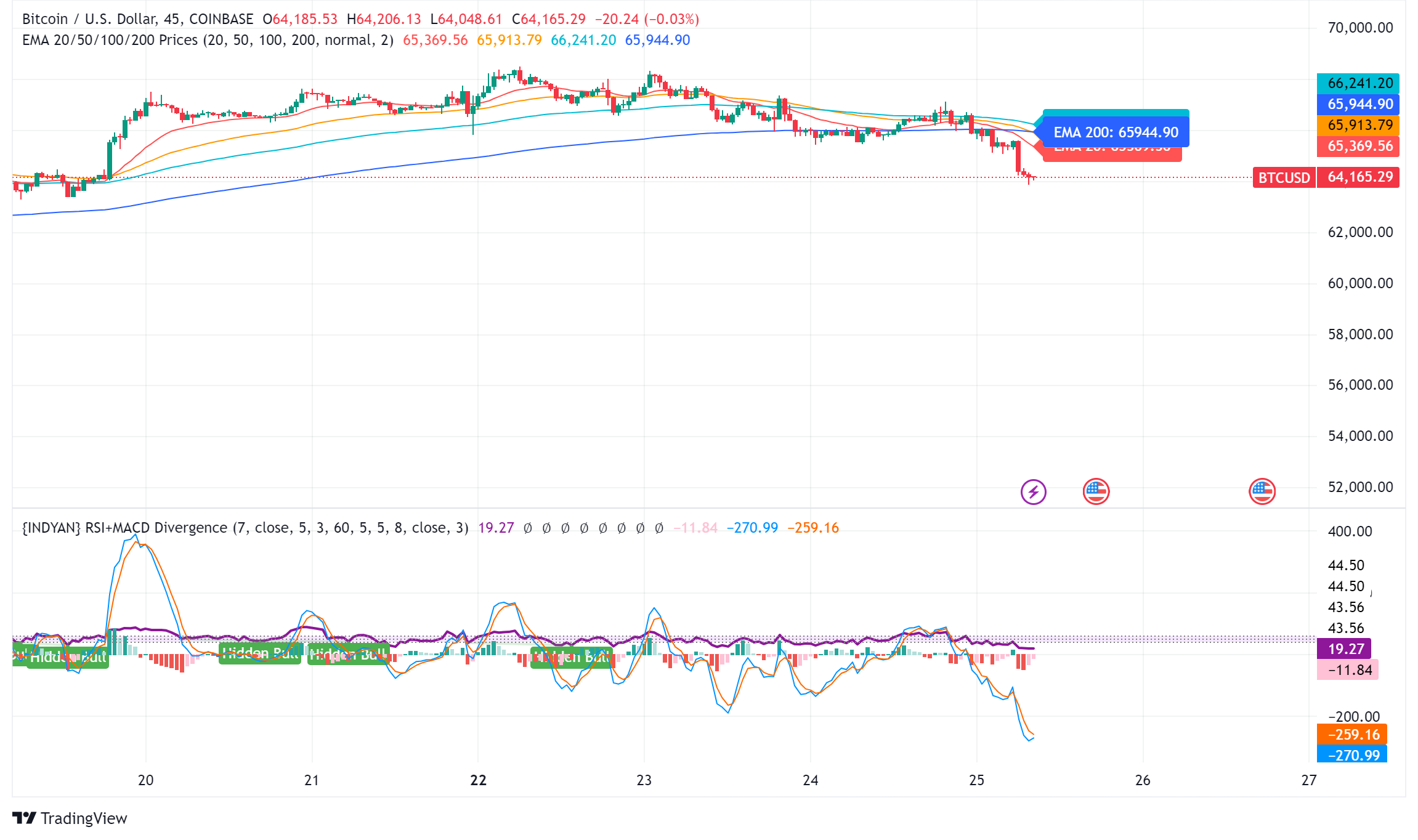
The world’s largest cryptocurrency, Bitcoin (BTC), suffered a significant price decline on Wednesday, falling below $65,000. The decline coincides with a broader market sell-off that has hit technology stocks hard.
Cryptocurrency Liquidations Hit Hard
CoinGlass data reveals a surge in long liquidations in the cryptocurrency market over the past 24 hours. These liquidations, totaling $220.7 million, represent forced selling of positions that had bet on price increases. Bitcoin itself accounted for $14.8 million in long liquidations.
Ethereum leads the decline
Ethereal (ETH), the second-largest cryptocurrency, has seen a steeper decline than Bitcoin, falling nearly 8% to trade around $3,177. This decline mirrors Bitcoin’s price action, suggesting a broader market correction.
Cryptocurrency market crash mirrors tech sector crash
The cryptocurrency market decline appears to be linked to the significant losses seen in the U.S. stock market on Wednesday. Stock market listing The index, heavily weighted toward technology stocks, posted its sharpest decline since October 2022, falling 3.65%.
Analysts cite multiple factors
Several factors may have contributed to the cryptocurrency market crash:
- Tech earnings are underwhelming: Earnings reports from tech giants like Alphabet are disappointing (Google(the parent company of), on Tuesday, triggered a sell-off in technology stocks with higher-than-expected capital expenditures that could have repercussions on the cryptocurrency market.
- Changing Political Landscape: The potential impact of the upcoming US elections and changes in Washington’s policy stance towards cryptocurrencies could influence investor sentiment.
- Ethereal ETF Hopes on the line: While bullish sentiment around a potential U.S. Ethereum ETF initially boosted the market, delays or rejections could dampen enthusiasm.
Analysts’ opinions differ
Despite the short-term losses, some analysts remain optimistic about Bitcoin’s long-term prospects. Singapore-based cryptocurrency trading firm QCP Capital believes Bitcoin could follow a similar trajectory to its post-ETF launch all-time high, with Ethereum potentially converging with its previous highs on sustained institutional interest.
Rich Dad Poor Dad Author’s Prediction
Robert Kiyosaki, author of the best-selling Rich Dad Poor Dad, predicts a potential surge in the price of Bitcoin if Donald Trump is re-elected as US president. He predicts a surge to $105,000 per coin by August 2025, fueled by a weaker dollar that is set to boost US exports.
BTC/USD Technical Outlook
Bitcoin price is currently trading below key support levels, including the $65,500 level and the 100 hourly moving average. A break below the $64,000 level could lead to further declines towards the $63,200 support zone. However, a recovery above the $65,500 level could trigger another increase in the coming sessions.
-

 News11 months ago
News11 months agoVolta Finance Limited – Director/PDMR Shareholding
-

 News11 months ago
News11 months agoModiv Industrial to release Q2 2024 financial results on August 6
-

 News11 months ago
News11 months agoApple to report third-quarter earnings as Wall Street eyes China sales
-

 News11 months ago
News11 months agoNumber of Americans filing for unemployment benefits hits highest level in a year
-

 News1 year ago
News1 year agoInventiva reports 2024 First Quarter Financial Information¹ and provides a corporate update
-

 News1 year ago
News1 year agoLeeds hospitals trust says finances are “critical” amid £110m deficit
-

 DeFi1 year ago
DeFi1 year ago🏴☠️ Pump.Fun operated by Insider Exploit
-

 Tech1 year ago
Tech1 year agoBitcoin’s Correlation With Tech Stocks Is At Its Highest Since August 2023: Bloomberg ⋆ ZyCrypto
-

 Tech1 year ago
Tech1 year agoEverything you need to know
-

 News11 months ago
News11 months agoStocks wobble as Fed delivers and Meta bounces
-

 News11 months ago
News11 months agoHutchinson House and Senate Candidates Report Finances Ahead of Election
-

 Markets1 year ago
Markets1 year ago20 Top Crypto Trading Platforms to Know












